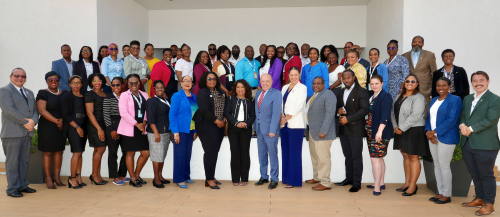 PHILIPSBURG (DCOMM):--- A representative of the Ministry of Public Health, Social Development and Labor (Ministry VSA) Collective Prevention Service (CPS) recently attended the Caribbean Public Health Agency (CARPHA) four-day Regional Multisectoral Workshop on Strengthening Emergency and Response (E&R) and Integrated Early Warning Systems (EWS), using CARPHA’s innovative EWS tools.
PHILIPSBURG (DCOMM):--- A representative of the Ministry of Public Health, Social Development and Labor (Ministry VSA) Collective Prevention Service (CPS) recently attended the Caribbean Public Health Agency (CARPHA) four-day Regional Multisectoral Workshop on Strengthening Emergency and Response (E&R) and Integrated Early Warning Systems (EWS), using CARPHA’s innovative EWS tools.
The workshop was organized to strengthen the Caribbean region’s capacity to detect and respond to public health threats in a timely manner.
“After the COVID-19 pandemic, continued monitoring and response preparation are the benefits that aligns with the global as well as local perspective which Sint Maarten from the public health arena, with its Dutch stakeholders and the Dutch National Institute for Public Health and the Environment (RIVM), are also discussing the need of a timely pandemic response, Early Warning Systems, prevention, and the concept of integration which is essential to ensure collective monitoring and response, contributing to best practice, providing information, experiences and the best methodology and approach.
“As a member state of CARPHA, it benefits Sint Maarten to be in contact and aware of what the guiding Public Health Agency is coordinating as well as its vision for the Caribbean, to be part of the collaboration between CARPHA’s Member States in preparing and responding to a pandemic.
“There will be a follow up for a next group from the Member States, and it will be beneficial for all stakeholders involved in response to health outbreaks to participate and get an insight in regards to the importance of data, being familiar with who is your focal points in the various arenas, and how essential it is, and how it can save time and definitely emphasizing the need to have an updated response plan.
“Considering the global COVID-19 evaluations and recommendations, there is a need for continual updating and for the professionals to be in tune with the developments constantly,” CPS said.
The workshop was held in Kingston, Jamaica, in July and brought together over 60 public health professionals from 11 Member States across the Caribbean.
Participants included national epidemiologists, surveillance officers, laboratory specialists, environmental health officers, emergency response coordinators, port health personnel, and representatives from ministries of health, tourism, and disaster management.
The training focused on improving emergency coordination, enhancing surveillance capabilities, and strengthening countries' ability to respond swiftly to public health threats.
CARPHA’s Pandemic Fund Project funded the workshop for Reducing the Public Health Impact of Pandemics in the Caribbean and its EU’s 11th European Development Fund Programme for Health Security Strengthening.
Countries were trained in CARPHA’s Caribbean-tailored innovative tools for strengthening EWS, such as CARPHA’s enhanced DHIS-2 system, Timeliness Metrics Strategy, Tourism and Health Information System (THiS), and Mass Gathering Syndromic Surveillance System (MGSS).
A key focus of the training was the introduction of CARPHA’s Timeliness Metrics Strategy. This Caribbean-specific tool helps countries assess how quickly they move from detection to response during a public health event in a Caribbean small island developing, tourism-dependent setting. With its use, countries can identify delays and bottlenecks and improve national decision-making timelines to prevent rapid spread and large outbreaks.